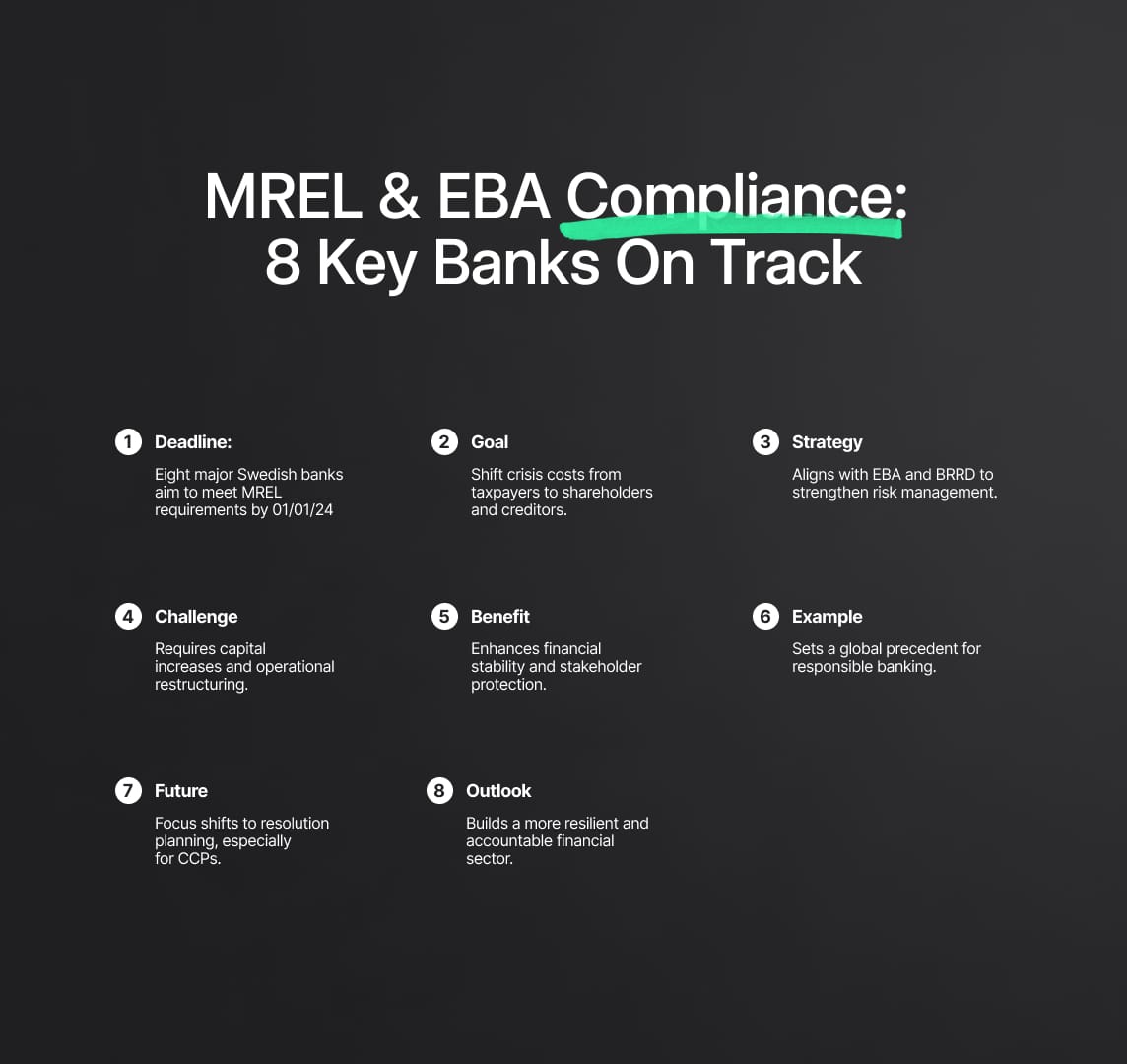MREL Compliance Requirements
Swedish banks are advancing towards MREL compliance, aligning with EBA guidelines for enhanced financial stability. With a 2024 deadline, this transformative journey represents a strategic shift in crisis management and fiscal responsibility.

Eight Systemically Crucial Banks on Track to Meet MREL and EBA Compliance Requirements
Eight major Swedish banks that have been regarded as essential to the financial system are moving closer to achieving the Minimum Requirement for Own Funds and Eligible Liabilities (MREL) in recent developments. This complies with the requirements set forth by the European Banking Authority (EBA) for effective crisis management. January 1, 2024, is the deadline for meeting these standards. In order to promote a more robust banking industry, MREL's main objective is to transfer the financial burden of managing future banking crises from the general public to the bank's owners and creditors.
These Swedish banks' attempts to adhere to EBA guidelines and comply with MREL reflect a proactive approach to financial risk management. By ensuring banks are better prepared to handle crises, this compliance ultimately serves to safeguard the public interest and the economy. Additionally, these actions set a good example for other financial institutions across the globe and are in line with global banking trends toward greater responsibility and transparency in financial operations. The banking industry is looking forward to these measures being fully implemented as the 2024 deadline draws near, since they will provide a more safe and stable financial environment for all parties involved.
MREL and Its Impact on the Banking Sector
The banking industry in Sweden is undergoing a dramatic transition as eight of the country's largest banks are moving closer to meeting the Minimum Requirement for Own Funds and Eligible Liabilities (MREL). This is in line with the strict guidelines set by the European Banking Authority (EBA), which aims to improve the financial system's crisis management capacities. The January 1, 2024, compliance deadline is a significant turning point in bolstering the resilience of the industry.
The EU's Bank Recovery and Resolution Directive (BRRD), which includes the MREL rules, sets mandatory financial thresholds for banks with an emphasis on qualifying liabilities and adequate capital. Following these recommendations is a strategic commitment to strong risk management, which is crucial for safeguarding the public interest and the economy. It goes beyond simply complying with statutory requirements.

MREL Compliance: A Strategic Move for Swedish Banks
For the banking sector in Sweden, MREL and EBA compliance is essential. This compliance shifts the onus of accountability from taxpayers to the shareholders and creditors of the banks, thereby reducing the danger of financial instability during crises. This change is a calculated step to strengthen the stability of the financial system. In addition, EBA's resolvability requirements guarantee that banks continue essential activities in times of crisis, protecting the interests of customers and the financial system.
This route is not without difficulties, though. Restructuring operations and increasing capital buffers are mandates for banks, which could have an effect on their short-term profitability. Notwithstanding these early challenges, it is anticipated that the strategic shift towards MREL and EBA compliance would pay off in the long run by strengthening the banking industry and benefiting all stakeholders.
Beyond 2024: The Future of Banking Post-MREL Compliance
The Swedish banking industry is putting a great deal of effort into putting these crucial protections into place as the 2024 deadline draws near. Creating thorough resolution plans is part of this, especially for central counterparties (CCPs), which are essential to improving banks' crisis management capabilities. There is a tangible sense of expectation for a more safe and stable financial future because these compliance initiatives have the potential to revolutionize the sector.
In the global financial scene, the proactive approach taken by Swedish banks to harmonize with EBA and MREL requirements sets a laudable precedent. Their efforts guarantee a capable and ready sector, equipped to handle upcoming financial crises and problems. The sector is keeping a careful eye on things as the 2024 deadline approaches, hoping to see the creation of a more stable, accountable, and transparent banking environment.
Reduce your
compliance risks

